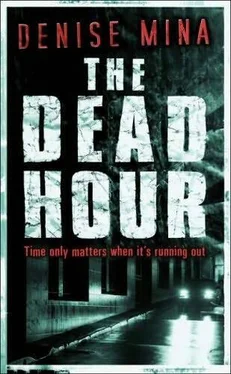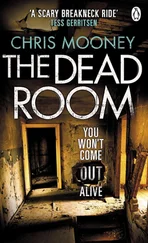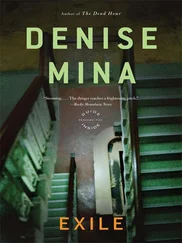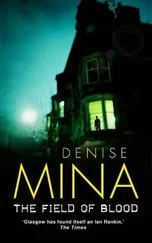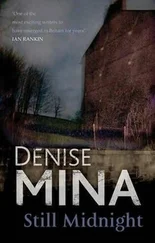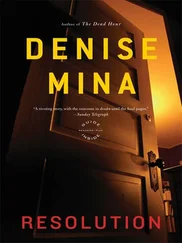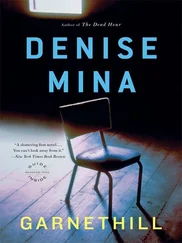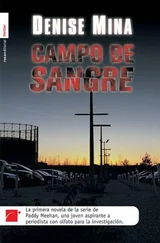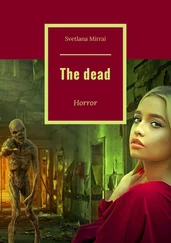It was a bit feeble. Flaky. She wanted him to know she was different now and knew what she had done. She added, “So, so, sorry.” But it didn’t seem any more sincere. She tried again. “I love you.” She wondered why everything she wrote sounded like last words.
She turned off the lights and opened the doors. She took her bolt cutters and climbed into the Mini, fitting the precious envelope under the seat, and heaved the steering wheel around to drive out of the garage.
Outside she stopped, afraid to turn the engine off in case it didn’t start again, and shut the doors, refitting the padlock so that a casual observer would think it still sealed. She drove down to the BMW and got out and picked up her shoes. She opened the BMW driver’s door wide and put the keys in the ignition, turning on the lights before retreating to the Mini and shutting the door. The arch was in a quiet corner of the city but she knew someone would see it. It would take at most a few hours for someone to help themselves.
The Mini rumbled along the cobbles until she finally reached a proper road. Even then she could feel every lump and bump on the road surface. She headed west, taking the deserted road out to Loch Lomond and the cottage.
The night shift were herded together in one corner of the newsroom. They stood unnaturally close to each other, an ill-assorted crowd, nervously straightening ruined ties and clearing smoky throats. Everyone was trying to hide behind someone else, all avoiding eye contact with the man in front of them.
Andrew Ramage was delivering an address to the troops. Paddy could see immediately that he was from the same place as them. He was working-class like most of the journalists and subs. He’d had the same paltry chances as them and despised them for not getting on as he had. She could hear it in his rounded London accent, see it in the expensive cut of his clothes which he touched every so often, stroking the seam of his steel gray suit jacket, touching the perfect cuff of his white shirt. She could see the thickness of a neck that had done hard physical graft at some point in his life. Farquarson had been privately educated, a middle-class boy who understood that he was from a privileged social stratum compared to the men who worked for him and had tried hard to compensate. He always had a gentler air about him.
Ramage paced the newsroom in front of them, crossing back and forth in front of the open door of Farquarson’s empty office. His hands were clasped behind his back in a Napoleonic gesture, uncoupling occasionally for an adamant wave or an air splice.
The night shift on any paper were the front line, he told them, the commandos. The night shift formed the back shop boys-and girl, he nodded at Paddy, a lopsided smile on his face. They caught the unexpected stories as they came in and without them the paper would be far, far less something or other. Paddy’s attention wandered. Neither she nor, she suspected, anyone else from the night shift recognized their jobs from Ramage’s description. They were only employed because missing the huge story that broke in the middle of the night every ten years or so, an earthquake in Armenia that killed tens of thousands, the unexpected death of a Soviet leader, would ruin the paper’s reputation and advertisers would stop buying space. The night shift knew they were nothing more than an insurance policy against Suits for Sirs and Bejam’s Freezer Stores moving their account to the Glasgow Herald.
Ramage raved on, shaming them with hyperbole until many of them began to wonder if they should have been doing something very noble at night instead of dozing or scratching their bollocks or fighting among themselves like kids in detention. He wanted them to know that the entrepreneurial spirit sweeping Britain was going to be welcomed at the News. Anyone could come straight to him with a story suggestion. Any time of the day or night, just knock on his door. It’s about selling papers, and stories sell papers. Let’s never forget that.
Then Ramage gave them the death blow: slightly less than half of them would be superfluous. The tight crowd drew in a collective breath but no one complained or spoke. Someone at the back sniggered and someone else struggled to clear an unclearable throat. The News needed producers, product. Come up with product and you’ll be safe, he said. Anyone who didn’t like the new regime could fuck off. Clear? He fixed them carefully with his gorgon gaze, hoping someone would go and get their coat and save him a big payout. The room was still.
He reminded them again that stories sell papers and left, walking through the silent room with every eye following him.
They stood for a moment, stiff necked, watching the door. A tentative voice from the back of the room muttered, “Cunt.” Ramage didn’t fly back into the room and sack the voice, so it was said again, louder, and another faceless voice agreed. Paddy looked around. Eyes were wide and frightened, falling on their neighbor, assessing where they each came in a ladder of indispensability. Paddy had no direct contemporaries. Her job was a one-off so she was probably safe. Unless they brought in someone from the day shift to replace her. Or used an agency.
The miserable group dissolved, floating slowly back to their desks. Most of them were exiled to the night shift because they were unpopular and unsympathetic. Richards wouldn’t fight for them. Allowing Ramage to decimate the night shift could well be Richards’s price for concessions on the changes to the day shift.
Paddy spoke to the retreating crowd. “Shouldn’t we do something about this? Object or something?”
A sub turned back to her. “Either they cut the staff or the whole paper goes down. Richards knows that. The NUJ knows that. There’s nothing we can do.”
“Won’t the print unions do something?”
The sub stopped and looked at her sadly. “Meehan, that’s why the management are refusing to buy the new presses. If the technology comes through the print union’ll be dead in five years and we’ll be doing all this ourselves. New editors like to slash and burn and make their mark anyway.” He flicked a finger at the door. “He’s making a list of everyone who doesn’t come up with a story idea. It could be a massacre.”
She was halfway down the stairs before realizing she hadn’t any ideas for any stories about anything.
Ramage’s office was on the editorial floor, one level below the newsroom. Because no one but the board and admin staff came to editorial during Farquarson’s reign, the corridor always seemed to have the heavy scent of lemon in it, as if the cleaners had just been and no one had passed through to stir up the air. But doors were opened into some of the rooms now and boxes piled up along walls where people were laying claim to the space. It felt like the emergence of a new class in a new regime, splitting off from the old journalistic camaraderie and boxing themselves away from everyone else.
Ramage’s name was on a door that she remembered from a scary incident a long time ago. Standing looking at it now made her feel sick and frightened. She knocked, waited for the call, and then opened the door to the conference room, the biggest on the floor.
Ramage was sitting a mile away, watching the door from behind a massive dark oak desk. The desk was built like a small castle: solid, square, and elaborately ornamented with carvings of apples, finials, oyster shells, all topped with a lush green leather top. It shamed the nasty industrial carpet and navy blue Hessian walls. All he had in front of him was a telephone, a leatherbound notebook, and a gold fountain pen. His chair was red leather, mounted on an oak frame that tipped back. He wore a crisp blue shirt and black suspenders, tipped back in his seat, tapping his teeth with the pen, and looking her up and down.
Читать дальше
